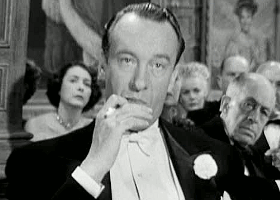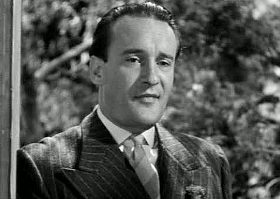 According to Entertainment Weekly contributor Rebecca Ascher-Walsh, when George Sanders was asked, shortly before his death, whether there was any role left he’d like to play, he replied, “Well, no one has ever asked me to play God. I suppose that’s what I would like.”
According to Entertainment Weekly contributor Rebecca Ascher-Walsh, when George Sanders was asked, shortly before his death, whether there was any role left he’d like to play, he replied, “Well, no one has ever asked me to play God. I suppose that’s what I would like.”
Few quotes could better encapsulate the public face of George Henry Sanders (1906-1972). As his published memoirs have it, he was Classic Hollywood’s first and foremost “professional cad.” Nearly every role his played, at least three of his four marriages, and even his suicide note testify to his pride in being a sneering scoundrel:
Dear World, I am leaving because I am bored. I feel I have lived long enough. I am leaving you with your worries in this sweet cesspool. Good luck.
But, of course, plumb the depths (to the degree we can with any accuracy) and you find the author of this note was a 65-year old man who had never fully recovered from his fourth wife’s death (according to niece Ulla Watson in her Afterword to Sanders’ memoir). A quick trip to Wikipedia lets you know by this age he was suffering from dementia and, according to fellow actor Brian Aherne (whose memoir I plan to read next), a minor stroke. Can one be a truly ruthless cad when one grieves, totters, and can’t remember the best of one’s bon mots?
As always, I find myself in the land of “be careful what you wish for” in getting to know George Sanders. His sexism I could laugh at — mostly because he lacked the power or will to do anything truly horrendous (like going into politics) with it. Many of his foibles (alcohol, many trysts and wives, putting down his profession) are typical of those who toss in their lot with Hollywood and come up celebrities.
But it’s painful to read his casual attempts to pith his way out of a life of wandering through professions with no true commitment to anything (including acting), five therapists, and a marriage to Zsa Zsa Gabor that he calls a series of “collisions.”The man could act, sing, play the piano, and write. And yet at no time in his memoirs does he simply say he is happy. Or, he does, but with such snark that you cannot take him seriously.
Nonetheless, the man was clever with words. And that’s what his memoirs show above all. Even if we learn little about him — and I think that’s his goal, frankly — we can enjoy the show. So, on with it! Below are some of my favorite quotes:
 Actors are oddly compounded of fact and fantasy. They are spell-binders who are bound by their own spells.
Actors are oddly compounded of fact and fantasy. They are spell-binders who are bound by their own spells.
For myself, I am content with mediocrity and I defy any producer to send me a good script. Since I confine my activities to the movies, the fructification of such an eventuality is extremely unlikely.
I suspect I am not as good an actor as Lassie and furthermore I am a man who is more likely to suffer from palpitations than to give them to others.
Perhaps my curious indifference to success will be more understandable if I explain that the driving force of my life has always been laziness; to practice this, in reasonable comfort, I have even been prepared, from time to time, to work.
It gives me no particular satisfaction to think that actors even more mediocre than I are hailed as great artists; it merely proves what lamentable taste most people have.
In any other business, as you become more successful you work less; you acquire minions who relieve you of the more onerous tasks. The actor cannot, however famous and successful, get somebody else to act for him. He always has to do it himself. The industrialist does not have to build factories and the oil tycoon does not have to dig his own wells in the desert. And a general does not personally have to stick bayonets into his enemy. In all these walks of life it is recognized that as soon as you are really good at something you can get somebody else to do it for you.
Modern conveniences are the source of modern inconveniences. They create as many problems as they solve. [Even more true today, I am certain George would say.]
It seems to me that we made a better job of it as arboreal apes and before that as nice neat fish.
Actually, the real femme fatale is the modest, virtuous, self-sacrificing housewife – the so-called “good” woman.
Beauty is often spoken of by preachers and pessimists as in some way contemptible because it is ephemeral. There seems to be a gloomy satisfaction in the thought of its inevitable destruction. Is it then better to be permanently plain? Is it, come to think of it, possible to be permanently anything?
I am not irreligious, atheistic or irreverent. I am not a champion of apostasy nor even an agnostic. I am just plain bewildered.
It is not for nothing that [actors] are the butt of so many humorous jibes. Yet however wacky we may be, at least we can say that we are harmless. We may bore some while we entertain others, but we injure no one. Ours is an innocuous profession.
 Now, I must acknowledge that there are a few more seemingly open moments, where one can see beyond Sanders’ cynical mask. But I cannot be sure this is not feigned, and I am certain Sanders wanted it this way. For example, he acknowledges:
Now, I must acknowledge that there are a few more seemingly open moments, where one can see beyond Sanders’ cynical mask. But I cannot be sure this is not feigned, and I am certain Sanders wanted it this way. For example, he acknowledges:
If human beings are ever to find any kind of peace they must learn how to live with one another and with themselves. This will only be possible when everyone has some knowledge of the motives, the compulsions and the impulses which determine his behavior. I think it is of far greater importance for schoolchildren to be taught psychology than mathematics. I would go further and say that all children should go through some form of analysis as part of the school curriculum.
And even more personally:
On the screen I am usually suave and cynical, cruel to women and immune to their slights and caprices. This is my mask, and it has served me faithfully for 25 years. But in reality I am a sentimentalist, especially about myself – readily moved to tears by cheap emotions and invariably the victim of woman’s inhumanity to man. That I should choose to protect my easily wounded and ultrasensitive nature by adopting my particular mask is understandable. Fortunately my mask has not only protected me but provided me with a living. Perhaps the greatest fulfilment in acting is not just the satisfaction involved in the opportunity for the extrovert to exhibit himself but more the opportunity to act out that part of himself for which he has the imagination and the capacity, but not the heart or the courage.
And yet he concludes the chapter in which the latter passage can be found as follows:
I mention all of the foregoing examples merely in order to make it easier for you to understand that whereas on the screen I am invariably a sonofabitch, in life I am a dear, dear, boy.
In the end of this brief, anecdotal dalliance of a book, we are left mostly with wit, wit, and more wit. But as to truly getting to know George Sanders? Not a whit. The author/star seems to ask with all he does and does not say: Are the inner workings of George Sanders’ mind really any of your business? And if so, would you know the truth if you read it?
References
Ascher-Walsh, Rebecca. “George Sanders’ Suicide.” Entertainment Weekly http://www.ew.com. 8 May 1992.
“George Sanders.” Wikipedia.
Sanders, George. Memoirs of a Professional Cad. 1960. Dean Street Press, 2015. Kindle edition.


August 12, 2015 at 4:56 PM
What he had to say about actors not being able to outsource their work is food for thought.
LikeLike
August 12, 2015 at 11:08 PM
Very true!
LikeLike
August 14, 2015 at 11:15 AM
Such a hard person/character to warm to I find. Love him on screen for of course just what he appears to be. But in life if I met or knew him I suppose his carefree put down attitude would cause me to come to some sort of disagreement resulting in a frustrated conversation.
LikeLike